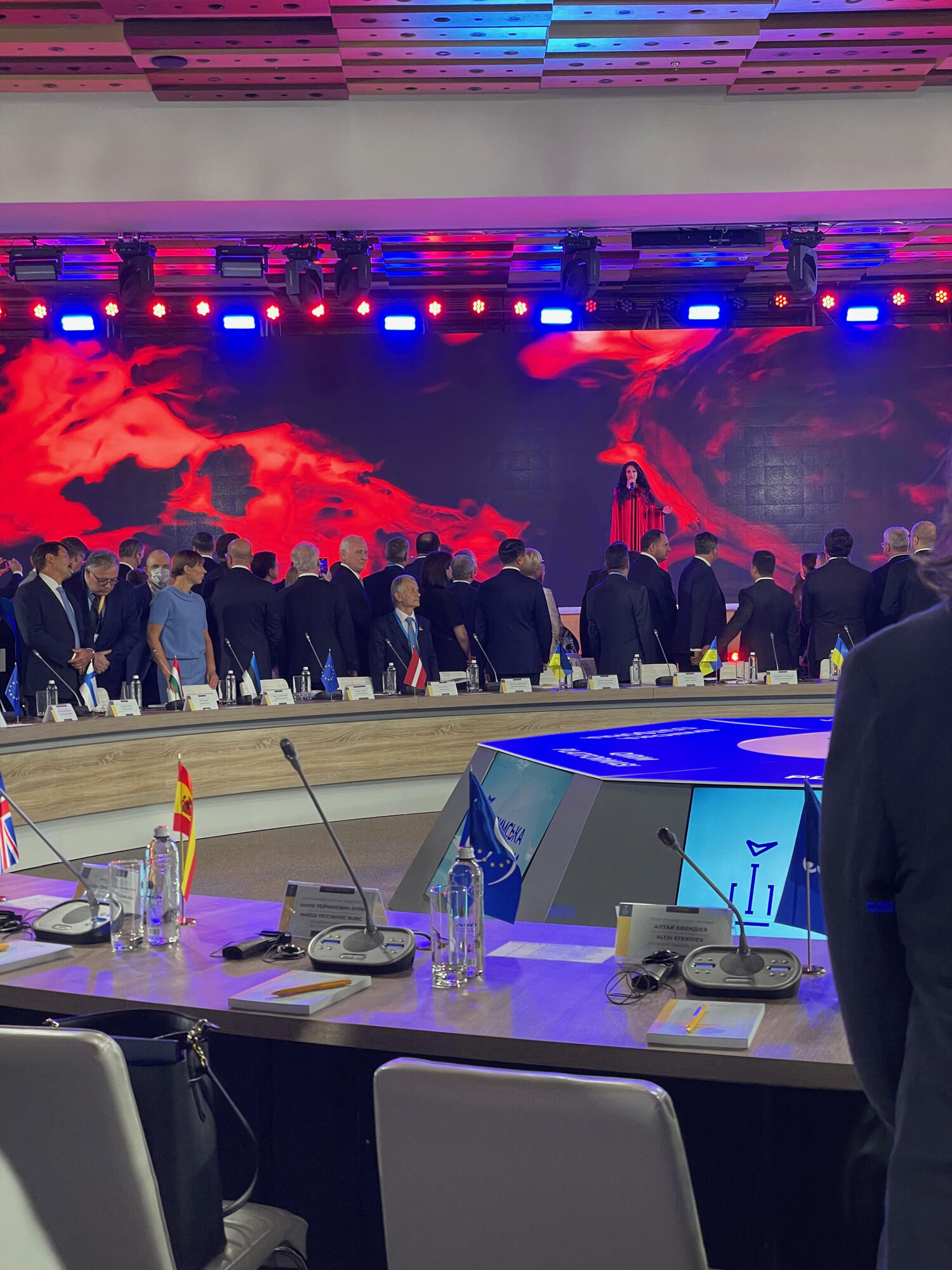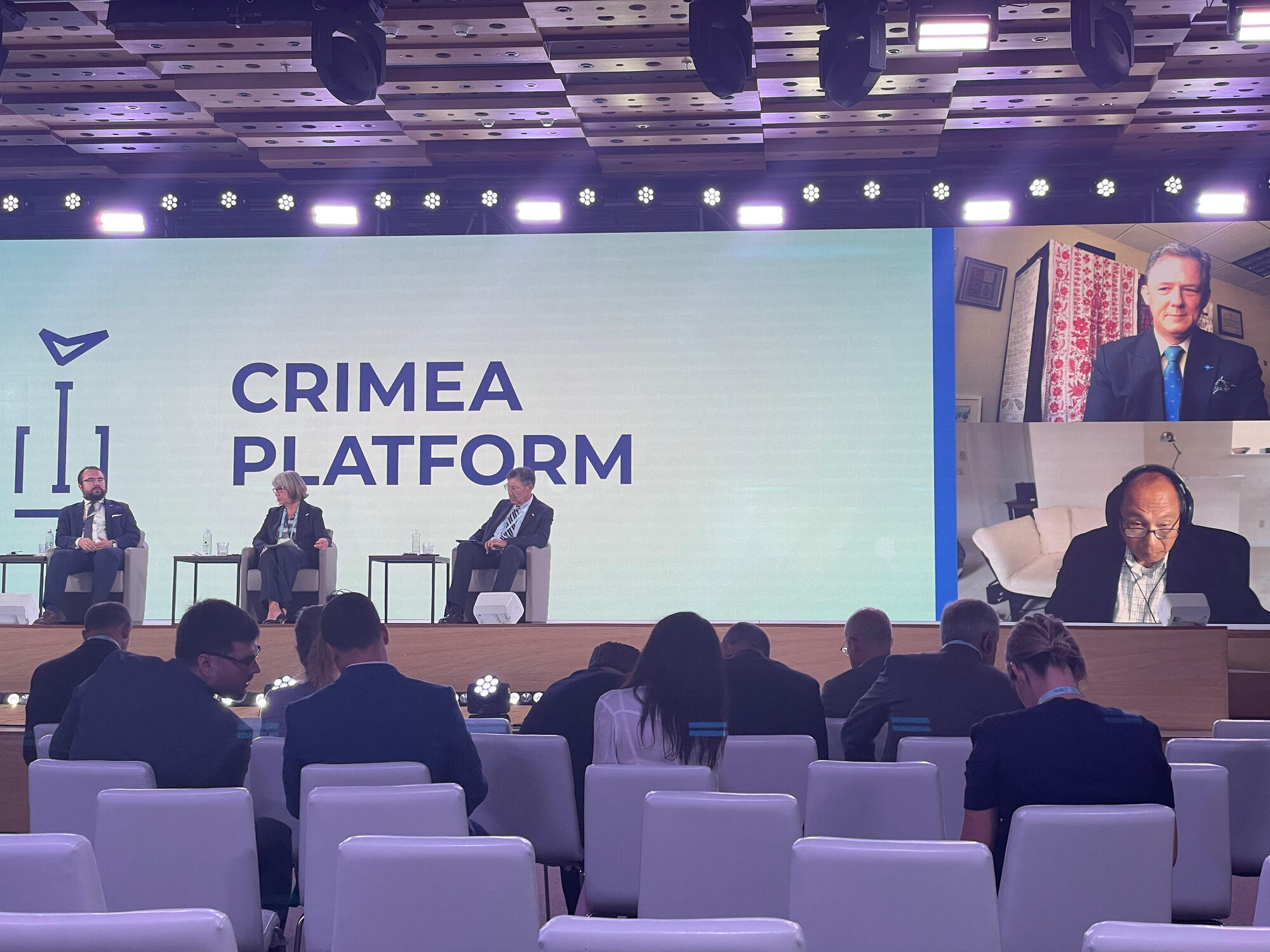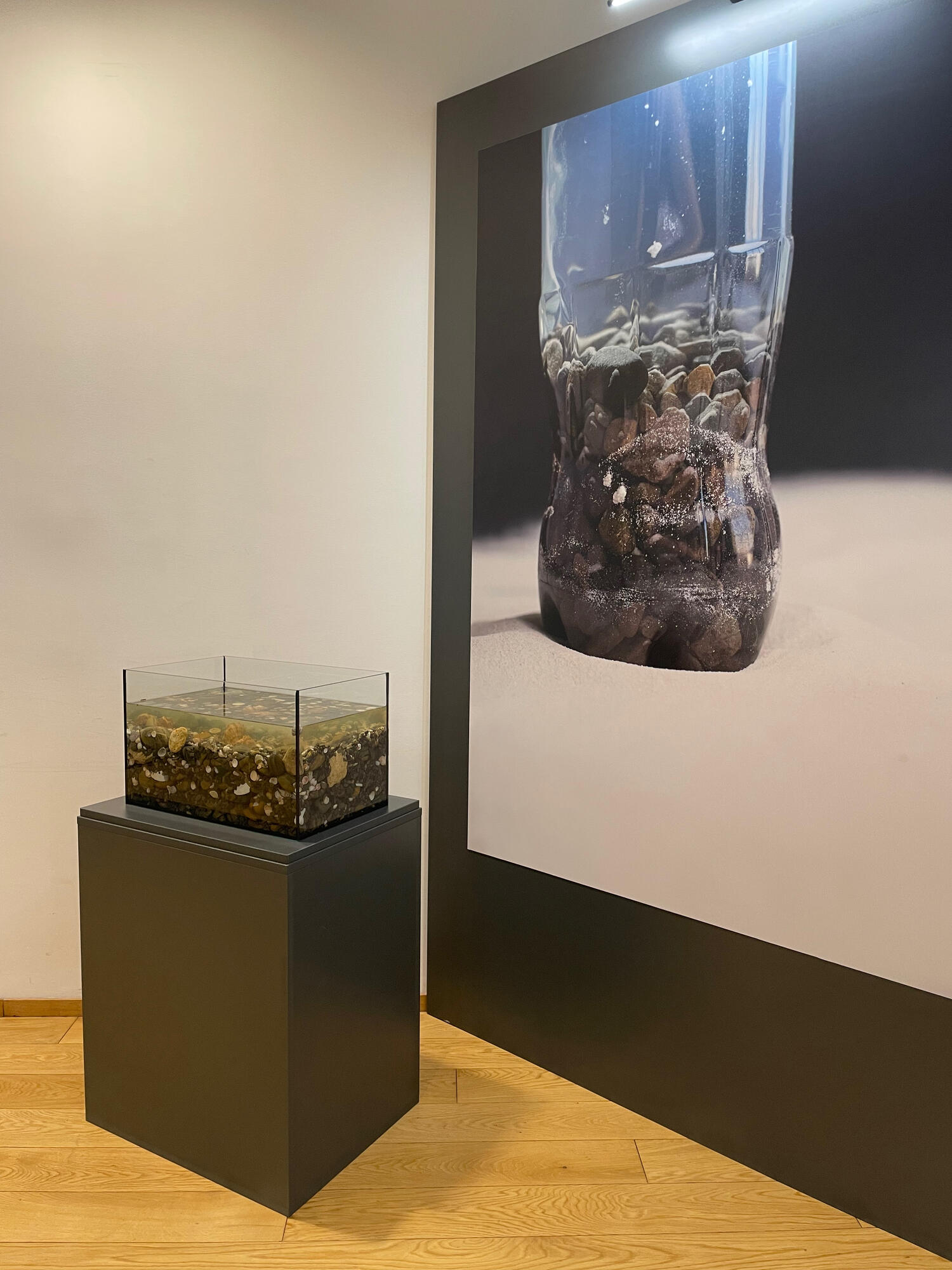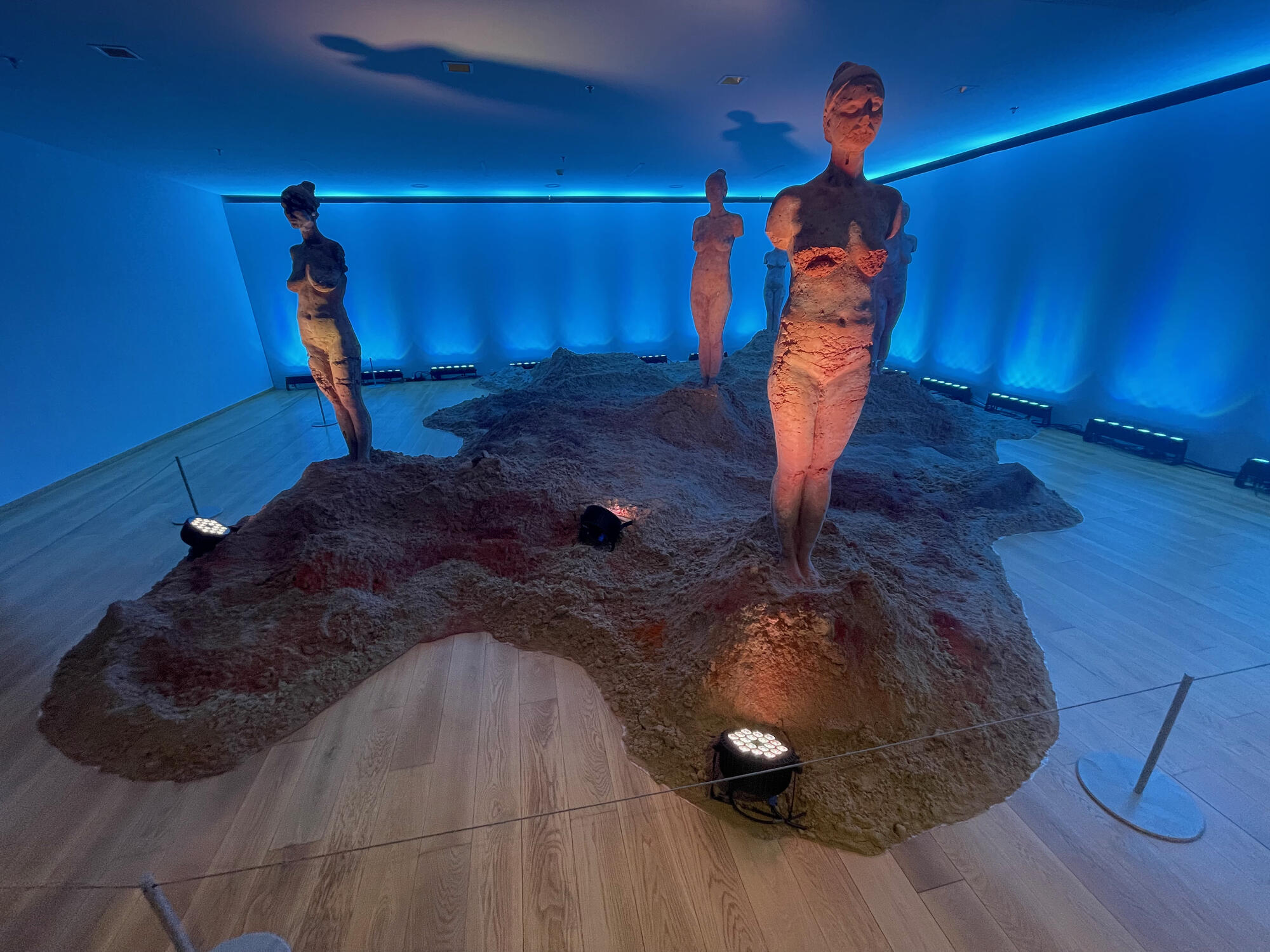![]() TCUP Director Emily Channell-Justice is in Ukraine for a month to conduct research for her project on internally displaced persons. On August 23, she attended the inaugural summit of the Crimea Platform, during which representatives from around the world gathered to discuss the peninsula and express support for Ukraine's territorial integrity.
TCUP Director Emily Channell-Justice is in Ukraine for a month to conduct research for her project on internally displaced persons. On August 23, she attended the inaugural summit of the Crimea Platform, during which representatives from around the world gathered to discuss the peninsula and express support for Ukraine's territorial integrity.
Following Ukraine’s independence in 1991, Crimea became an Autonomous Republic of Ukraine. It had its own Parliament and made its own laws, but the territory was part of Ukraine. In 2014, following the Euromaidan uprising and the ousting of then-President Viktor Yanukovych, Russian armed forces occupied Crimea. In March 2014, Russian President Vladimir Putin held a referendum that asked residents if they wanted the territory to be part of the Russian Federation; that vote resulted in the official Russian annexation of Crimea. However, before the referendum, many Crimean residents—particularly Crimean Tatars and Ukrainians—left the peninsula for mainland Ukraine, and those who remained were prevented from voting or boycotted the referendum.
Thus, it has been seven years since the annexation of Crimea. In those years, much of Ukraine’s focus has been on negotiating an end to the war in Eastern Ukraine, where Ukrainians and their allies are continuing to give their lives to preserve Ukraine’s independence and recover its territorial integrity. The annexation of Crimea is widely considered a fait accompli, with little or no hope that the peninsula can be returned to Ukraine. But Crimean Tatar political figures (and many of their Ukrainian allies) have never agreed with this assessment. They have been fighting to put Crimea back on President Zelensky’s agenda, with the ultimate goal of returning Crimea to Ukraine’s control.

On August 23, the day before Ukraine’s Independence Day, I attended the inaugural summit of the Crimea Platform. An idea initiated by Crimean Tatar representatives and supported by President Volodymyr Zelensky, the Platform summit brought together 46 delegations, representing various countries and international organizations such as the European Council and GUAM Organization for Democracy and Economic Development. Ukrainian representatives included President Zelensky, Prime Minister Denys Shmyhal, Minister of Foreign Affairs Dmytro Kuleba, Chairman of the Verkhovna Rada Dmytro Razumkov; speaking on behalf of the Crimean Tatar community were Mustafa Dzhemilev (current member of Parliament and leader of the Crimean Tatar National Movement) and Refat Chubarov (chairman of the Crimean Tatar Mejlis).
The meeting of delegates kicked off with Eurovision winner Jamala singing “1944,” her winning song about the deportation of Crimean Tatars under Stalin. President Zelensky opened the proceedings, calling the Crimea Platform a “concrete step” that Ukraine is taking toward deoccupation of the Crimean peninsula. Following comments by the Ukrainian representatives, speakers representing 37 of the delegations made remarks in support of the platform. These speakers included several presidents—Maia Sandu from Moldova, Sauli Niinistö from Finland, Andrzej Duda from Poland, and several others. Each of the three Baltic states (Latvia, Lithuania, and Estonia) had presidents representing their countries, and each made statements likening the annexation of Crimea to the annexation of the Baltic states by the Soviet Union in 1940. President Kersti Kaljulaid of Estonia spoke about her experience visiting the conflict zone in Donbas, and, more recently, the Chonhar checkpoint in Crimea. Other representatives, including Hungary’s President János Áder and Georgia’s Prime Minister Irakli Garibashvili mentioned their countries’ experiences of great powers imposing their force on smaller countries.
Many representatives reiterated the importance of a rules-based international order and Russia’s flagrant flouting of those rules of sovereignty in the case of Crimea. Many also affirmed their commitment to the non-recognition of Russia’s claims to Crimea. President Niinistö of Finland mentioned the Helsinki Final Act, which established the foundation of European security principles based on territorial sovereignty. He encouraged the adversaries to engage in a dialogue despite their differences in order to foster an environment in which we can live in peace. Slovenia’s president Borut Pahor echoed a call for Ukraine and Russia to re-establish bilateral relations and find a resolution to their claims to Crimea and to the war in Donbas diplomatically, using his own country as an example of how to establish a dialogue with Russia in order to ensure good relations.

Several representatives, including European Council President Charles Michel and Polish President Andrzej Duda, also mentioned the grave human rights situation on the peninsula, commenting specifically on the illegal detention of Crimea citizens, forcible recruitment into the Russian army, and threats to freedom of language and freedom of religion. These remarks were especially poignant considering that the repression of Crimean Tatar and other political activists has been growing since the annexation; as recently as August 16, a Russian court sentenced four Crimean Tatars to 12-18-year prison sentences for alleged ties to Hizb ut-Tahrir, an Islamic political party labeled as a terrorist organization by Russia. Over 200 people (mostly Crimean Tatars) have been sentenced or are being prosecuted in Crimea for political charges, according to the Crimean Tatar Resource Center.

Turkey’s Foreign Minister Mevlüt Çavuşoğlu commended President Zelensky on Ukraine’s recent recognition of Crimean Tatars as an indigenous population, and he advocated for the international community to speak in one voice on the issue of Crimea. Jennifer Granholm, the United States Secretary of Energy, elaborated on the US’s concrete support for Ukraine, including security assistance and lethal defensive weapons, as well as the ongoing sanctions against Russia. Marija Pejčinović Burić, the Secretary General of the Council of Europe, stated that the Council was the first organization to offer Ukraine support following the annexation and will continue to promote human rights, democracy, and the rule of law. Together, the delegations signed the Joint Declaration of the Inaugural Crimea Platform Participants.
The absence of delegates from the Russian Federation was felt throughout the summit, and it showed both a lack of interest on the part of Russia to find a diplomatic solution and an indication that Russian representatives do not intend to reverse their claims on Crimea. None of the delegates spoke Russian at any time during the summit--indeed, the Croatian and Polish Presidents spoke Ukrainian during their remarks. While Russia’s absence was perhaps expected, it was a stark reminder that President Zelensky faces an uphill battle to return Crimea to Ukraine.
Following the delegates’ statements, the Platform hosted several thematic panels in which Ukrainian government figures and international experts expressed their support for the Crimea Platform. These speakers, including Francis Fukuyama, US Deputy Assistant Secretary George Kent, and US Congressman Gerry Connolly, pushed back against the assumption that the annexation of Crimea is a fait accompli and advocated for US and international support for Ukraine’s claims to the territory.

In addition to these discussions, the Crimea Platform featured several exhibits highlighting the culture and history of Crimea. The “Symbols of Crimea” exhibit included the voices of 10 displaced people who call Crimea “home” and who chose a symbolic object that is linked to their lives in Crimea, such as coffee, lavender, or figs (photographs by Roman Pashkovskyi). According to the exhibit description, “[t]he exhibition is structured to create a sense of belonging and presence. The objects are depicted as if they had just been used, they have a palpable warmth of life and a bitter taste of loss.” The We Are Crimea series, cosponsored by the Ukraïner project and the Ukrainian Institute in Kyiv, used virtual reality to bring Crimea to life for participants.
The art installation “Stardust” was especially moving. First presented at Mystetskyi Arsenal in Kyiv in 2019, Maria Kulikovksa’s representation of her homeland of Kerch is a multi-sensory experience. Colors and sounds stood out, even among the multiple crumbling statues of female forms. The material making up the physical depiction of Kerch is made with colors that evoke the Crimean peninsula—the artist said she could not actually source the materials from Crimea, so she focused on the colors instead. The backdrop—a shifting light of different hues—is taken from photos from her last time in Crimea in 2014, before the annexation. In the background, the sound of cicadas fills the room. The female forms, which are intentionally reminiscent of Greek sculpture because of Crimea’s Greek heritage, are a commentary on the role of women in Greek society (and in many patriarchal societies over time). Women were seen as the foundation of the family, but they had no political rights and were not citizens. Further, the bodies represent not just women but the intersection of many cultures and history in Crimea.Yet, they are also crumbling under the weight of so many occupations and deportations—not just the 2014 events, but the similar tragedies that took place during the Russian Imperial and Soviet periods. The installation was an exceptional addition to the platform, and the artist’s presence there was an important reminder that Crimea is represented by a multitude of voices.

Overall, the Crimea Platform was an extremely successful event that brought together global support for Ukraine and for Crimea. In the beautifully appointed Parkovyy International Convention Center, the Summit was comfortable and well-organized (despite an hour-long delay in starting the thematic panels). While only two delegates at the speakers’ table (Niinistö of Finland and Sandu of Moldova) wore masks during the summit, most audience members wore masks; the convention center’s large terrace made it easy for participants to comfortably socialize outside. For many of us who had not attended in-person events for over a year, it was an important occasion to observe in person and a significant show of support for Ukraine and Crimea.